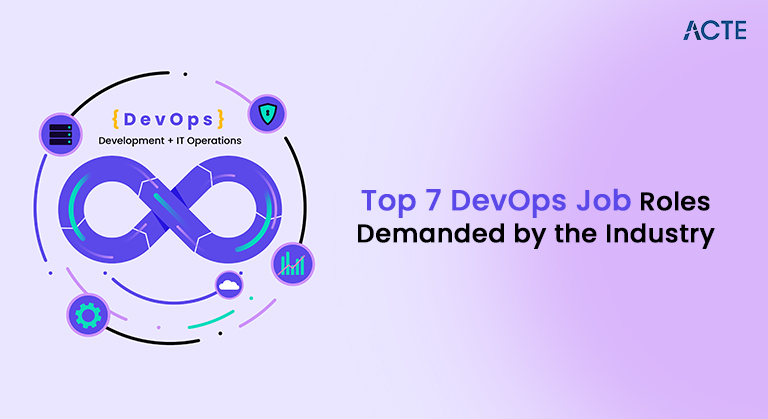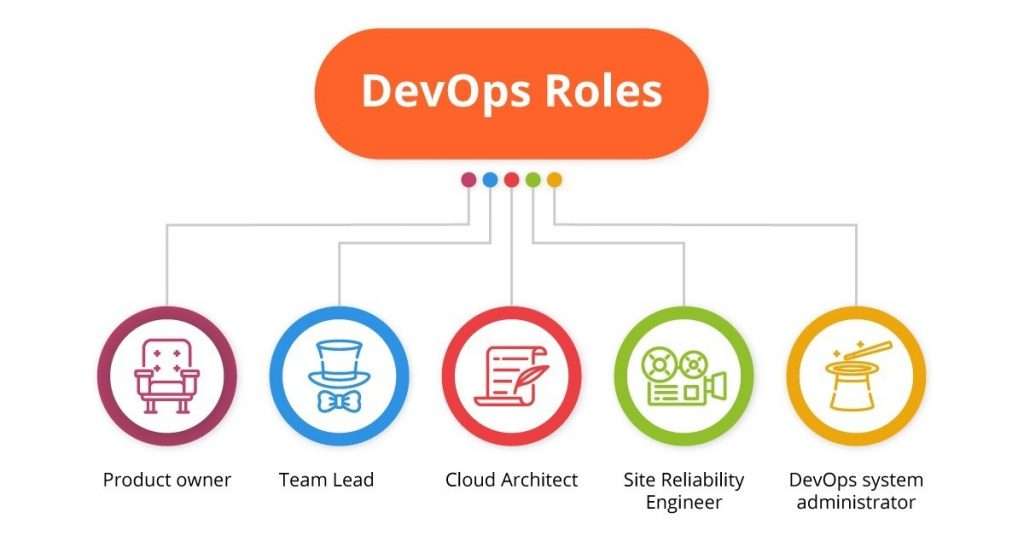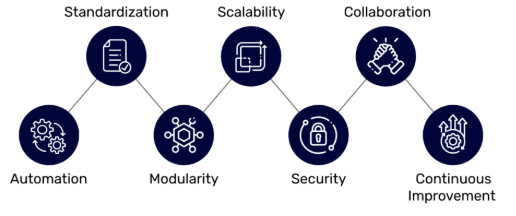
- Introduction to DevOps
- Why DevOps is In-Demand
- Top 7 DevOps Job Roles
- DevOps Engineer
- Site Reliability Engineer (SRE)
- Cloud Engineer
- Automation Engineer
- Build and Release Engineer
- Continuous Integration/Continuous Deployment (CI/CD) Engineer
- Infrastructure Engineer
- Skills Required for DevOps Job Roles
- Conclusion
Introduction to DevOps
DevOps, which closes the gap between operations and development teams, has become a major strategy in the current rapid technological landscape. Through promoting a culture of collaboration, continuous integration, continuous delivery, and automation, DevOps ensures that businesses can deliver high-quality software faster and more efficiently. The demand for DevOps professionals has skyrocketed as organizations increasingly recognize the importance of DevOps in achieving speed, scalability, and security in software development and IT operations. DevOps combines tools, practices, and a cultural shift to improve collaboration between traditionally siloed teams. It enables continuous development, testing, and deployment of software applications. As a result, DevOps has led to the emergence of various job roles that are now in high demand.
Why DevOps is In-Demand
The increasing adoption of cloud platforms, agile methodologies, and the need for faster software delivery have contributed significantly to the rise in demand for DevOps professionals. Businesses need to stay competitive in the market, which has driven the necessity for automating repetitive tasks, accelerating deployment cycles, and ensuring consistent infrastructure management. As organizations move toward digital transformation, DevOps has proven to be an essential methodology for meeting the ever-increasing pressure to innovate and deliver software rapidly. Companies that invest in DevOps practices achieve greater agility, reduced operational costs, improved software quality, and enhanced customer satisfaction.
Top 7 DevOps Job Roles
With the increasing use of DevOps practices, various specialty roles have appeared to facilitate coordination between development and operations teams. These positions are crucial for increasing automation, speeding up software delivery, and guaranteeing system performance. Organizations in all industries now look for experienced DevOps engineers to enhance infrastructure performance and provide constant integration and deployment. Understanding these key DevOps positions can result in exciting career prospects for individuals wishing to build a career in the digital industry. These are the 7 best DevOps jobs currently in high demand in the tech industry. The demand for DevOps staff with cloud expertise is increasing rapidly as more businesses continue to shift to the cloud. Gaining expertise in these fields improves employability and positions professionals at the forefront of digital transformation.

DevOps Engineer
DevOps engineers are at the heart of the DevOps transformation. They play a critical role in automating and managing the software development lifecycle. DevOps engineers work on the integration and delivery pipeline, ensuring the continuous code flow from development to production. They collaborate with development and IT operations teams to ensure smooth deployments and infrastructure automation.
Key Responsibilities:- Automating deployment and configuration management tasks.
- Managing CI/CD pipelines.
- Monitoring system performance and troubleshooting issues.
- Ensuring system reliability and scalability.
- Working with cloud platforms (e.g., AWS, Azure, GCP).
- Implementing infrastructure as code (IaC) practices.
Site Reliability Engineer (SRE)
Site Reliability Engineers (SREs) ensure that systems are highly available, reliable, and scalable. They combine software engineering skills with operational expertise to design and manage infrastructure that is robust, resilient, and able to handle high traffic levels. SREs also focus heavily on monitoring, incident response, and performance tuning.
Key Responsibilities:- Managing system uptime and reliability.
- Building automation for operational tasks.
- Writing code to monitor systems and improve performance.
- Ensuring system scalability and fault tolerance.
- Collaborating with DevOps teams to improve system reliability.
Cloud Engineer
Cloud Engineers specialize in managing and optimizing cloud-based infrastructure. They design, implement, and maintain cloud environments, focusing on providing scalable and cost-efficient solutions. Cloud Engineers work with major cloud providers such as AWS, Azure, and Google Cloud Platform (GCP) to ensure that applications are securely deployed and operate smoothly on the cloud.
Key Responsibilities:- Designing cloud infrastructure and applications.
- Migrating on-premise systems to the cloud.
- Managing cloud environments for cost-efficiency and performance.
- Implementing cloud security best practices.
- Monitoring cloud resources and optimizing costs.
Automation Engineer
Automation Engineers focus on automating repetitive tasks and manual processes within the software development and IT operations lifecycle. They implement automation scripts and tools to accelerate testing, deployment, and configuration management processes. Automation Engineers help improve efficiency and reduce human error by automating routine tasks.
Key Responsibilities:- Developing automation scripts for testing and deployment.
- Managing automated testing and CI/CD pipelines.
- Implementing infrastructure automation with tools like Ansible, Chef, and Puppet.
- Integrating automated systems with monitoring tools.
- Ensuring the reliability and scalability of automated processes.

Build and Release Engineer
Build and release engineers focus on automating the build and deployment processes. They ensure that code is compiled, tested, and packaged correctly before being released into production environments. They provide software releases that happen on time, without errors, and with proper version control.
Key Responsibilities:- Managing the build process and automated builds.
- Ensuring seamless release management and version control.
- Working on deployment pipelines and automation tools.
- Troubleshooting build and deployment issues.
- Coordinating with development teams to ensure successful releases.
Continuous Integration/Continuous Deployment (CI/CD) Engineer
CI/CD engineers specialize in designing and maintaining the continuous integration and continuous deployment (CI/CD) pipeline. This pipeline automates the processes of building, testing, and deploying code, allowing developers to release new features and updates more frequently and with higher quality.
Key Responsibilities:- Designing and implementing CI/CD pipelines.
- Automating the process of code integration and testing.
- Monitoring the deployment process and fixing issues.
- Ensuring smooth integration of new code with the existing system.
- Collaborating with DevOps teams to enhance automation.
Infrastructure Engineer
Infrastructure engineers manage and maintain the underlying IT infrastructure on which applications run. This role involves working with both hardware and software to ensure infrastructure stability, scalability, and security. Infrastructure engineers are also responsible for implementing and managing virtualized environments and cloud-based infrastructure.
Key Responsibilities:- Managing physical and virtualized infrastructure.
- Designing and configuring networks, servers, and storage.
- Ensuring infrastructure is secure, scalable, and resilient.
- Supporting automation and IaC practices.
- Managing disaster recovery and backup strategies.
Skills Required for DevOps Job Roles
DevOps job roles require technical skills, automation knowledge, and a strong understanding of the software development lifecycle (SDLC). Below are some common skills that are crucial across various DevOps roles:
- Programming/Scripting: Proficiency in Python, Shell, Go, and Ruby.
- Version Control: Familiarity with tools like Git and GitHub.
- Cloud Computing: Knowledge of cloud platforms such as AWS, Azure, and GCP.
- Automation Tools: Experience with automation tools like Ansible, Chef, Puppet, and Terraform.
- Containerization: Experience with Docker and Kubernetes for managing containerized applications.
- CI/CD: Understanding CI/CD principles and tools like Jenkins, GitLab CI, and CircleCI.
- Monitoring and Logging: Familiarity with tools like Prometheus, Grafana, and the ELK stack for monitoring and logging.
- Networking: Understanding networks, load balancing, DNS, VPNs, and firewalls.
- Security: Knowledge of security practices such as encryption, access control, and vulnerability management.
Conclusion
DevOps is rapidly transforming the software development and IT operations landscape. As businesses continue to embrace DevOps practices, the demand for skilled professionals in various DevOps roles will only grow. The top 7 DevOps job roles outlined above provide ample opportunities for those looking to enter or advance their careers in DevOps. Each role within the DevOps ecosystem offers unique challenges and responsibilities. Still, they all share a common goal: enhancing collaboration, automation, and the speed at which high-quality software is delivered. Whether you’re interested in infrastructure, automation, or cloud technologies, there’s a place for you in the evolving world of DevOps.





